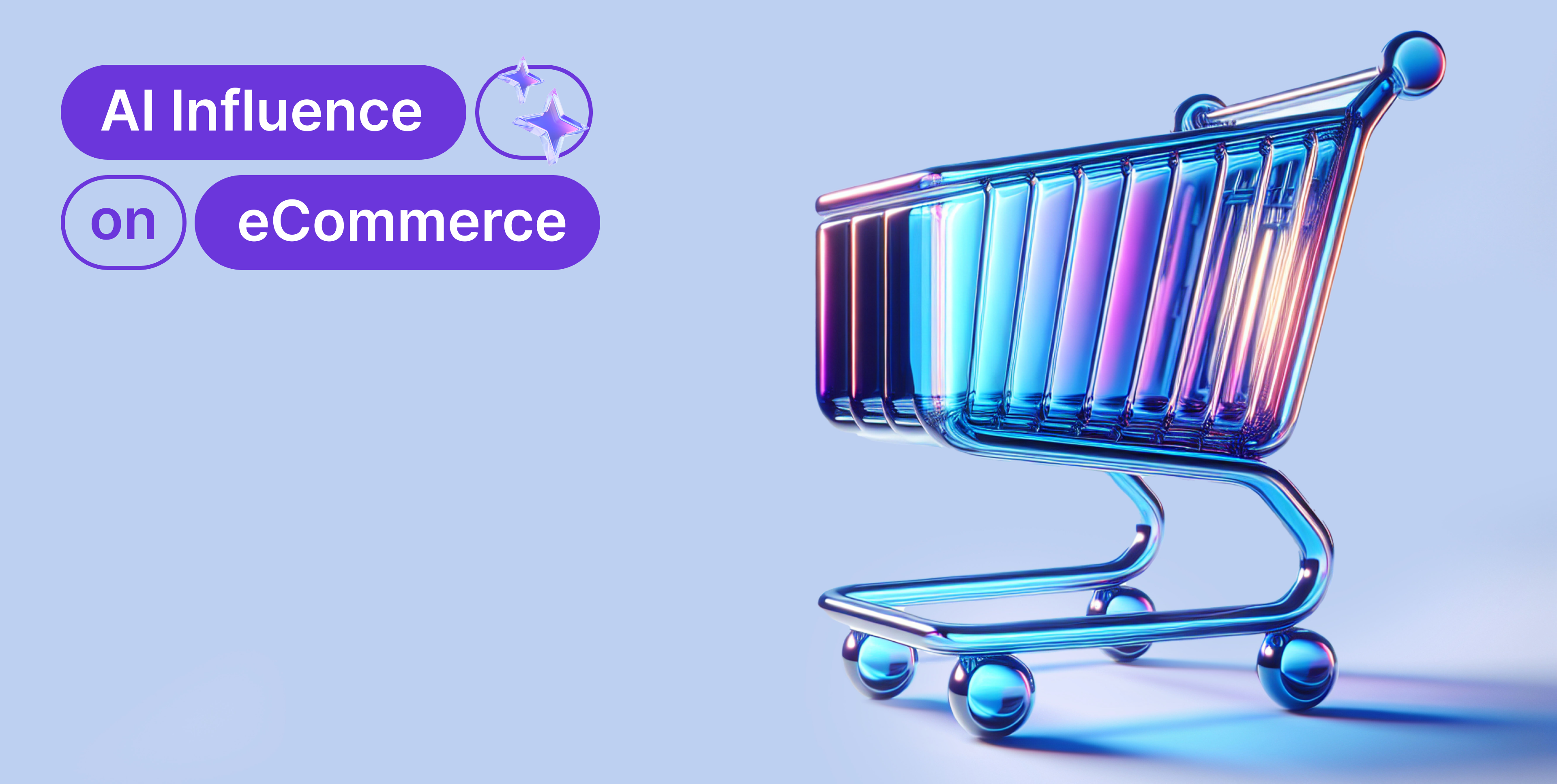The Power of AI in eCommerce for B2B & B2C Success
• Customer Support
• FastBank

The world of eCommerce has changed. Where once businesses relied on traditional methods to predict and meet customer needs, AI in eCommerce has now become the secret ingredient for success.
Whether you're a B2B company with complex transactions or a B2C brand aiming to offer that personal touch, AI is helping businesses do more than survive - it's helping them thrive.
But what does this really mean for your business? How to use AI in ecommerce and drive measurable results?
In this article, we'll reveal the powerful ways AI in eCommerce is getting reshaped and why the businesses that adopt AI now will be the ones leading the charge in the future.
B2B vs B2C: Key Differences in AI Adoption
When it comes to AI in eCommerce, B2B and B2C businesses are playing two very different games - each with its own rules, players, and winning strategies.
B2C brands are all about speed and spark. They use AI like a personal shopper who knows what their customer wants before they do. It's about quick decisions, instant gratification, and building loyalty with every click.
B2B companies, though? They're in it for the long haul. Their deals are bigger, cycles are longer, and there are more moving parts. That's why AI in B2B eCommerce acts more like a behind-the-scenes strategist - forecasting demand, streamlining logistics, and keeping complex operations humming smoothly.
Different goals, different tools - but the same powerful engine driving them forward: AI.
AI in B2C eCommerce
B2C eCommerce is fast-paced, and customers expect things to feel effortless and personal. This is where AI really shines. It's the brains behind those impressively accurate product recommendations, the chatbots that never sleep, and the discounts that seem perfectly timed.
AI-powered eCommerce in the B2C space helps brands turn browsers into buyers without breaking a sweat. It crunches customer data, tracks behavior, and figures out what each shopper wants - sometimes before the shopper even knows it.
It's not magic; it's a smart use of AI. And if you're not using it, chances are high your competitors are.
AI in B2B eCommerce
Now, the B2B world may not have the glitz of splashy product suggestions but don't underestimate how much AI is transforming it.
Here, it's less about impulse and more about precision. AI in B2B eCommerce handles the heavy lifting - whether it's predicting when a client will need a restock, automating quotes for bulk orders, or spotting trends in purchasing patterns that humans might miss.
It's like having a digital operations manager working around the clock, making sure the gears keep turning smoothly. The result? Less time wasted, fewer errors, and happier clients who stay.
Pros and Cons of AI Solutions for eCommerce
AI in eCommerce offers clear advantages - no question. But knowing both sides of the story helps you avoid surprises down the road. Whether you're already exploring AI use cases in eCommerce or just starting to test the waters, it's all about finding the balance between automation and human touch.
Pros
1. Your Store Becomes a Mind Reader
Ever get the feeling a website knows what you're looking for? That's not luck - it's AI in eCommerce quietly analyzing clicks, carts, and wish lists to suggest spot-on products. Customers feel like your store gets them, which keeps them coming back.
2. Inventory Headaches? Hand Them Over to AI
No more spreadsheets and second guesses. Artificial intelligence and machine learning tools monitor sales trends, seasonal shifts, and even unexpected surges, helping you restock (or hold off) at just the right time. It's like having a backstage manager ensuring your shelves are never empty - or overcrowded.
3. Customer Support That Never Sleeps
AI-powered chatbots ensure eCommerce customer service that doesn't need coffee or lunch breaks. They're there to answer questions, track orders, and calm anxious customers at any hour. Perfect for keeping things smooth without stretching your support team thin.
4. Smarter Marketing, Less Wasted Effort
Forget blasting generic promos. AI solutions help you send offers to the right people at the right moment based on real behavior - not guesswork. Your campaigns feel more like thoughtful nudges than random noise.
5. Data Overload? Let AI Do the Heavy Lifting
Data is everywhere: website traffic, purchase history, and customer feedback. AI tools sift through the mess and highlight the insights you actually need - so you can make informed decisions without drowning in numbers.
Cons
1. Setup Isn't Always a Breeze
Despite what some ads claim, AI isn't something you just plug in and watch work. Getting AI solutions for eCommerce to fit your unique business often takes time, custom setups, and a few headaches.
2. People Still Crave the Human Touch
AI can handle repetitive questions, but it can't replace empathy. Some customers prefer talking to real people, especially when things get tricky or emotional. Over-automating might leave them feeling a little cold.
3. Costs That Sneak Up on You
The promise of efficiency is great, but it's not always cheap. Between licensing fees, integrations, and ongoing updates, expenses can add up. Small businesses especially need to consider long-term ROI.
4. Privacy Rules Get Tighter
AI thrives on data, but with that comes responsibility. Mishandling customer information - or failing to comply with privacy regulations - can damage trust faster than any tech can fix.
5. No "Set It and Forget It" Option
AI isn't a one-time deal. It needs regular check-ins, updates, and fine-tuning to stay relevant. If you ignore it too long, you might find it no longer aligned with your goals or your customers' needs.
AI Use Cases in eCommerce
The future of eCommerce is powered by AI, enabling businesses to predict customer needs, automate processes, and deliver hyper-personalized experiences. Now, let's take a look at the powerful use cases shaping the industry.
AI-Driven Content Personalization
Every customer is different, and their shopping journey is unique. AI can create personalized content for each visitor on your site, from tailored email campaigns to customized landing pages that feature products they've shown interest in. AI can help you create dynamic content that adapts to each customer's preferences. This level of personalization leads to higher engagement, more conversions, and a stronger connection with your brand.
AI-Optimized Shipping
AI for eCommerce ensures speed in everything - especially when it comes to shipping. AI can help streamline your logistics by optimizing delivery routes, predicting shipping times, and even selecting the best shipping partners. By analyzing data from previous shipments, AI can make smarter decisions on how to cut down delivery times and reduce shipping costs. Plus, customers get the added benefit of faster, more reliable delivery - something they'll appreciate when they see how quickly their order arrives at their doorstep.
Predictive Analytics for Demand Forecasting
By analyzing historical sales data, market trends, and external factors (like holidays or upcoming events), AI can predict which products will be in high demand and when. This gives you the insight you need to stock up on popular items ahead of time, avoid overstocking slow-moving products, and plan your sales strategies more effectively.
AI-Driven Customer Retention
It's much easier to retain a customer than to find a new one - and AI is here to make that happen. AI solutions can analyze customer behavior and identify when a shopper might be at risk of leaving. From there, you can send personalized re-engagement emails, offer discounts, or remind them about items they've abandoned in their cart. By anticipating needs and offering timely incentives, AI helps build long-lasting customer relationships, increasing lifetime value and boosting repeat sales.
AI-Powered Chatbots for Seamless Returns and Exchanges
Returns and exchanges are a common part of eCommerce, but they don't have to be painful. AI assistants and AI-powered chatbots can streamline the entire process, guiding customers through return policies, issuing return labels, and even offering product recommendations to replace the returned items. This creates a smoother, more efficient return experience that reduces customer frustration and helps maintain positive relationships, even when things don't go as planned.
Last Words
Whether you look at B2B or B2C eCommerce, the differences in AI implementation are clear - one prioritizes precision, personalization, and long-term relationships; the other focuses on speed, scalability, and instant engagement. Yet despite these distinctions, the destination is the same: AI is no longer optional. It is the foundation of modern commerce.
Ultimately, no matter who you're selling to, AI is the common thread driving smarter, faster, and more meaningful customer experiences.
And in this AI-driven landscape, businesses need the right tools to keep up. Hoory AI helps eCommerce brands bridge the gap between service and experience - streamlining support, personalizing shopping journeys, and keeping customers engaged. See how AI can elevate your eCommerce business here.

























